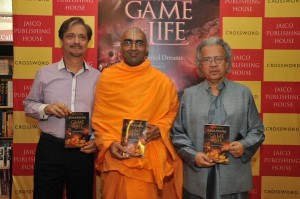By: Keyur Seta
He also speaks about airplanes during Ramayana era and other interesting things related to mythology during the launch of his book Shattered Deams.
Author Shubha Vilas explained the importance of epics like Ramayana and Mahabharata by highlighting that such books were the only source of learning even for great emperors. “Shivaji Maharaj gained knowledge and wisdom only from these epics. How can a great emperor like him rely only on two books? So I feel it is now time to show how exciting and enlightening these epics are.”
He was speaking at the launch of his book Shattered Dreams, the second in the six part series on Ramayana. The first titled Rise Of The Sun Prince released last year. Prominent columnist Anil Dharker was the guest at the event, which took place at the Kemps Corner branch of Crosswords in Mumbai on Thursday.
Vilas spoke about the mixture of entertainment and enlightenment produced by such epics. “The heart requires entertainment but mind requires enlightenment. When there is a mixture of both, it becomes a complete experience.”
In his book, Vilas has described an airplane called Pushpak Vimana. There have been a lot of talks and debates currently over whether there were airplanes in India thousands of years ago. So, obviously, Vilas was asked about this. His answer became the highlight of the event.
“NASA has appointed two Sanskrit scholars on their payroll. Their job is to interpret Vedic texts, especially Vimana Shastra, which was written during Ramayana by Maharishi Bhardwaj. Vimana Shastra has detailed descriptions on how to make a flying machine. So, if NASA believes in it, there has to be some truth in it,” he said.
By referring to his book, Vilas also described the dissatisfaction among people these days. “Villagers look for something more promising in cities, city dwellers look at America for the same reason and Americans look at the moon. The wise prefer to be satisfied in the existing.” He also criticized the attitude of people living in cities when it comes to reading epics. “They ask, what is in it for me and how will it help me if I invest two hours in it?”
During the course of the discussion, Dharker pointed out about the growing interest among authors in mythology. “Few years ago, you (Vilas) wouldn’t have thought about writing such a book. Also, nowadays publishers have opened up to different types of literature. It is good that people like Shubha are modernizing our epics and teaching life lessons through it.”
